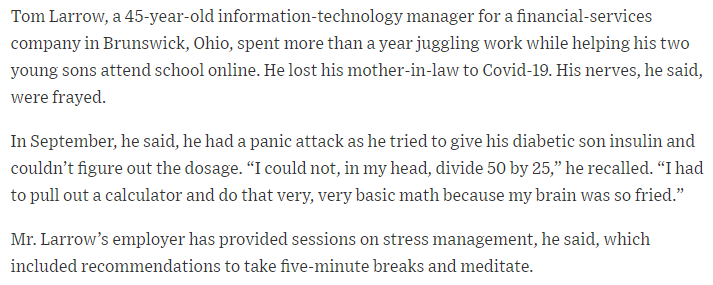I am 42. I checked out my 401k. If I do nothing different and stay the course I’ll be in line for a 60k income at 65. Which will be worth garbage in 2045. So I gotta do more.
It’s really hard to answer these questions anecdotally. Because there is such a huge bubble of people attaining conventional retirement ages every month, there are constant retirements from the workforce. A lot of people are attributing retirement behavior to the pandemic but there’s no control group. Attributing the retirements to WFH instead of people just getting old is some serious post hoc narrative building.
My mom is 70 and she still substitute teaches because she doesn’t know what to do with herself during the day.
My stepdad was still working on a contract basis as an architect until covid. He tried to set up a home work environment but couldn’t get it to work, so he went ahead and fully retired
My father is back at work at 74. My parents have zero savings and a 250k mortgage. Both collecting Social Security. He runs a crane and as long as he works full time he can make over 100k. So hard for him to stop working until he keels over.
Well jeez somebody has to great people at Walmart I guess…

But seriously, good for him. My dad could barely operate a shopping cart by the time he turned 74.
If my dad goes it’s time to figure out how to support my mom. But yeah my dad has been some form of heavy equipment operator or involved in the garbage industry my whole life. He’s always doing some project or whatever but had to stop when my mom got cancer. He was working all up and down the east coast out of a used RV. He only recently at like 70 got put on blood pressure (mild) medicine. His Dad lived to 85 but was an alcoholic who eventually got liver cancer.
I went to the office for the first time in 21 months yesterday. Couldn’t remember what floor we were was on. I had to start at 11 and work my way down.
update please?
Nothing new. They haven’t called me yet. But I’m not sure the move has occurred.
heh. im likely going to plan an exit from my current place in the new year. it bothers me that there’s noone who i can hand off or braindump to. but it will be their problem at that time. my company doesn’t call anyone after they leave for help.
@mosdef this one’s for you!
Lost a loved one to COVID, home-schooling two kids (one who needs insulin) and completely fried? Take a shot what the company thinks you should do? DO YOU EVEN MEDITATE BRO???
LOL yeah one “mental health day,” that should solve chronic burnout!
Not mentioned even once: PAYING PEOPLE MORE MONEY
In fact, its often the opposite. I keep seeing stories of companies agreeing to permanent WFH… with a 20% pay cut. Its ludicrous. Im saving my company money on B&M and I lose money because of it? Makes perfect sense.
If you’re paid more you’re immediately less stressed out, far more than if you get one day off a year or meditate for 5 mins a day or whatever. You can pay for shit that makes your life better, reduce debt, etc.
Obviously this is all less so for many people here, the jump from $150k to $160k is borderline meaningless but going from $40k - $50k is life changing.
Well in a purely sociopathic labor market way, if you want to work from home and they want you in the office then you have to give them a concession for that. Or threaten to quit and basically call their bluff.
I have worked at two very large companies in the past 2 years, both in the top 1,000 in the world by market cap. In each place, there has been a deliberate gutting of support functions (think IT, legal, HR, etc.) that has had a HUGE unacknowledged impact on the mental health of the workforce. There has been a big movement in the large corporate workforce to kill off all departments that don’t generate revenue, and make their activities “self serve” for producing employees. This created a short term fictitious “gain” where the observable direct cost of the staff providing those services went away, and no one noticed in the short term that what it did was make everyone else less productive - at a net negative. So if your workforce cost for support functions used to be (making up numbers) 10% revenue then the new normal is that cost is 1% of revenue (yay!) but all your colleagues are producing at 80% of what they used to because they are spending 20% of their time dicking around on Workday or filling out compliance forms and questionnaires or dealing with customer complaints about the system generated invoice being wrong.
I actually think that what most stressed out people want more than a 20% pay raise is a 20% increase in the size of the teams so they can actually do all the stuff that’s supposed to be done without getting scolded for missing sales targets. There’s a massive agency problem with senior leaders promising automation to the Board and come hell or high water they’re going to get it. If sales are down because the automation is just a shell game? Well, not to worry we’re turning over the whole team of VPs leading sales and replacing them with new hires. The old VPs sucked, ldo.
This is absolutely the case in Ontario health care as well, and it’s absolutely infuriating in a world where policy makers fret constantly about the cost of health care but their solution is to eliminate admin staff and have doctors submit billing. Great use of resources!
This is spot on.
My team spends so much time cleaning up messes that exist because of poor or non-existent support functions. Senior management simply does not care.
I had a rule when we outsourced IT. If I had a problem after 3pm I went home. My other choice was to go into someone else’s office/cube and take their productivity down to 0 as well.
Speak for yourself. That jump for us was hot tub money and that is life changing :)

